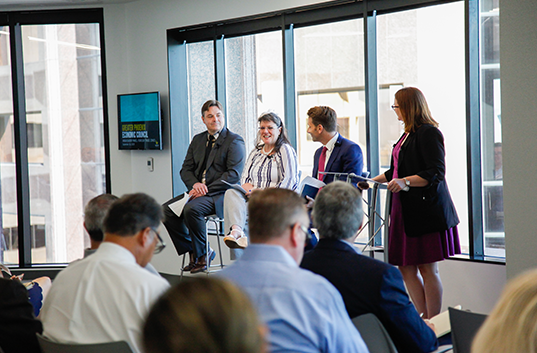

Foreign Trade Zones in Greater Phoenix
Published: 09/20/2019
Updated: 12/23/2019
Industry experts discuss how the FTZ program can benefit our regional economy
Greater Phoenix’s pro-business climate and economic development programs have made it even easier to conduct business in the region now more than ever before. In fact, Arizona is one of two states that have additional benefits for companies located within a Foreign Trade Zone (FTZ). A Foreign Trade Zone is a designated location in the United States where companies can use special procedures that help encourage U.S. activity – in competition with foreign alternatives – by allowing delayed or reduced duty payments on foreign merchandise, as well as other savings.
To better understand the what, the where and the why of FTZs, the Greater Phoenix Economic Council (GPEC) hosted an Ambassador panel featuring industry experts. The panelists included Brian Friedman, economic development director for City of Glendale; Julie Pettit, president and owner of Arizona Gateway Logistics; and Daniel Seiden, director of Arizona government affairs for Intel Corporation. The panel was moderated by Kristen Stephenson, GPEC’s vice president of research and analytics, with more than 50 attendees in the audience.
Foreign-Trade Zones in Arizona
Companies that would receive an economic benefit from the deferral reduction or elimination on duties from imported products can utilize an FTZ. Julie Pettit explained that these companies must also satisfy public interest in order to qualify for the FTZ program. For example, a company with 100 or more employees and a robust business model will get the attention of the municipalities, Pettit said.
“The type of company that both the federal and local municipalities will be interested in is one that will utilize the Foreign Trade Zones to their fullest extent,” Pettit said.
There are currently seven FTZs activated in Arizona, with three located in Greater Phoenix. Locating a company in Arizona in an activated FTZ or subzone provides a lower assessment ratio on property taxes. Ultimately, this can result in property tax savings of up to 73% per year. This way businesses can save on property taxes and help the economy and community in other ways.
Brian Friedman provided an anecdote about the City of Glendale’s experience with FTZs. He said that after the municipality deliberated for months to utilize a portion of their land as an FTZ or not, they chose to spur development in the “New Frontier District,” encompassing the Loop 303 corridor, Luke Air Force Base and the Woolf Logistics Industrial Campus.
Glendale chose to create an FTZ with 540 acres of land, which just so happened to be exactly what Red Bull, Ball Corporation and Rauch needed for an expansion. This resulted in Red Bull, Ball Corporation and Rauch choosing to build their new, multimillion-dollar facility in Glendale.
Utilizing Foreign-Trade Zones to maintain regional competitiveness
The panelists agreed that utilizing an FTZ correctly can create interest in that marketplace, which is one strategy that Greater Phoenix can use to maintain competitiveness. Pettit specifically mentioned that it is important for the cities in Greater Phoenix to work together, especially regarding economic development. By doing so and utilizing FTZ properly, this could result in a boom to our regional economy.
“Foreign Trade Zones are meant to help import and export businesses grow and thrive in this country and keep up with global competitiveness,” Daniel Seiden said. “I think Intel is one of the great American company success stories because we have benefitted from these zones.”
Seiden described how after Intel qualified for an FTZ in 1994, the company experienced tremendous job growth.
“In Arizona, Intel currently has about 10,000 high-wage jobs that pour back into the economy, we invest $50 million into local businesses, put money into school districts, we are a great community partner, and the infrastructure projects that we have built with our neighbors are truly impressive,” Seiden said. “None of this would be possible without Foreign Trade Zones to encourage this growth and maintain competitiveness.”
Kristen Stephenson closed with the point that “even though FTZs come with some challenges, ultimately, this program is very beneficial for the manufacturers and will create a ripple effect throughout the entire economy.”
Other benefits of a Foreign-Trade Zone
- No duties on or quota charges on re-exports
- Custom duties and federal excise tax deferred on imports
- In situations where zone production results in a finished product that has a lower duty rate than the rates on foreign inputs, the finished products may be entered at the duty rate that applied to its condition as it leaves the zone
- Companies using FTZ programs may have access to streamlined customs procedures such as weekly entry or direct delivery
- Foreign and domestic goods held for export are exempt
Are you interested in staying up-to-date on Greater Phoenix’s growth and advocating for the region’s competitiveness? Become an Ambassador – learn more.